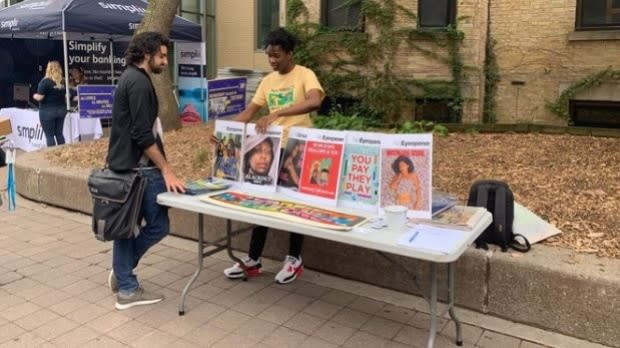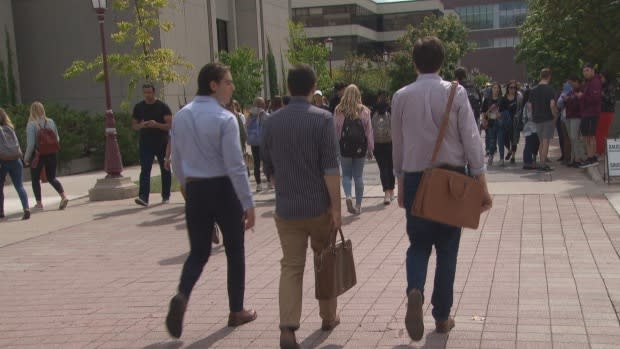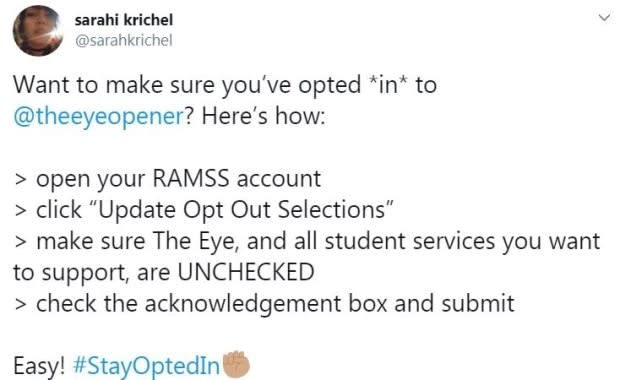Campus media makes last push to get students to opt in to fees
Campus radio stations and newspapers are collaborating province-wide to fend off what could be a threat to their existence posed by the Ontario government's "student choice initiative."
Student choice — announced last January — allows college and university students to opt out of non-essential fees that fund student groups, as well as campus stations, newspapers and clubs.
Late in the spring, campus media cut staff and resources to prepare for worst-case scenarios, with predictions funding could drop beginning this term by as much as 40 to 50 per cent.
Now the papers and stations are making their last push to convince students to stick with their campus media by not opting out before the fee deadline this month. And they've decided to work together on strategy.
We're having to be really creative... - Sarah Krichel Editor-in-chief Eyeopener
"We're having to be really creative," said Sarah Krichel, the editor-in-chief for the Eyeopener, a student paper at Ryerson University.
Editors strategize
Krichel met virtually to compare notes and share strategies with editors from papers at the University of Toronto, the University of Western Ontario, Queen's University, the University of Ottawa and Carleton University.
She said Eyeopener staff and volunteers have taken a direct approach, setting up tables during Frosh week to speak with students about their work. It is also working with other papers to collaborate on content about the issue.
"We're coming at it in a unified way," Krichel said.
"The big takeaway was the feeling of solidarity," said Matt Gergyek, the editor-in-chief at the Fulcrum newspaper at the University of Ottawa.
Bilingual campus dilemma
The Fulcrum has a special problem as the English-language newspaper on Ontario's only bilingual campus.
Gergyek said if French-language students opt-out, it could represent 40 per cent of his newspaper's funding.

"We're hoping they recognize that for the cost of a cup of coffee at Starbucks they see the value of the work we do," he said. The French-language paper on campus, La Rotonde, faces the same concern.
The savings for opting out of all non-essential fees vary at universities across the province, but represent a range from $60 to $150 per student out of some $2,000 in total school fees each year.
Anticipating a worse-case scenario, the Fulcrum stopped producing a printed version of the paper last spring. It also cut half its staff, and lowered salaries for the remaining editors.
Early figures optimistic
Early figures from August, however, suggest the opt-out problem for the newspaper may not be as bad as the projections based on the previous experiences of campus papers in Australia and New Zealand when similar legislation was introduced.
Carleton University's Charlatan is also relieved with early reports on opt-out numbers. The Charlatan had also cut staff, and reduced the printed paper from a weekly to a monthly.
Editor-in-chief Bailey Moreton said the main concern now is keeping those students opted in before the tuition fee deadline of September 17. And then the lobbying begins all over again when the winter term begins, he said.

Campus radio's existence in jeopardy
Campus radio stations are also working together.
The National Campus and Community Radio Station Association launched a petition, concerned the Ontario legislation could spread to other provinces.
But Matthew Crosier — station manager at Carleton University's CKCU — said radio stations are even more vulnerable to the loss of stable funding, because they require a certain base amount just to stay on air. The sudden precarious nature of the funding through the student choice initiative is a real threat to the station's ability to survive from term to term, he said.
"There's a semester that starts again in January and you have to think that the opt out rate will grow from semester to semester," said Crosier, who anticipates a 20 per cent reduction of the station's funding this term. If it gets any lower, he said, the station could be in jeopardy.
"It doesn't feel very positive," he said, "It's hard enough to run a large operation filled with student volunteers, trying to do the best programming you can do, and further complicate that by greatly reducing the funding — it makes a difficult situation more difficult."

But Krichel said the Eyeopener having to prove its value to all students may make it a stronger paper.
"Every publication has dealt with this in the real world" she said. "Every publication is dealing with not having as many resources as we used to. So now student publications are in that same boat and while we used to be protected by student levies, now we just have to get creative."


